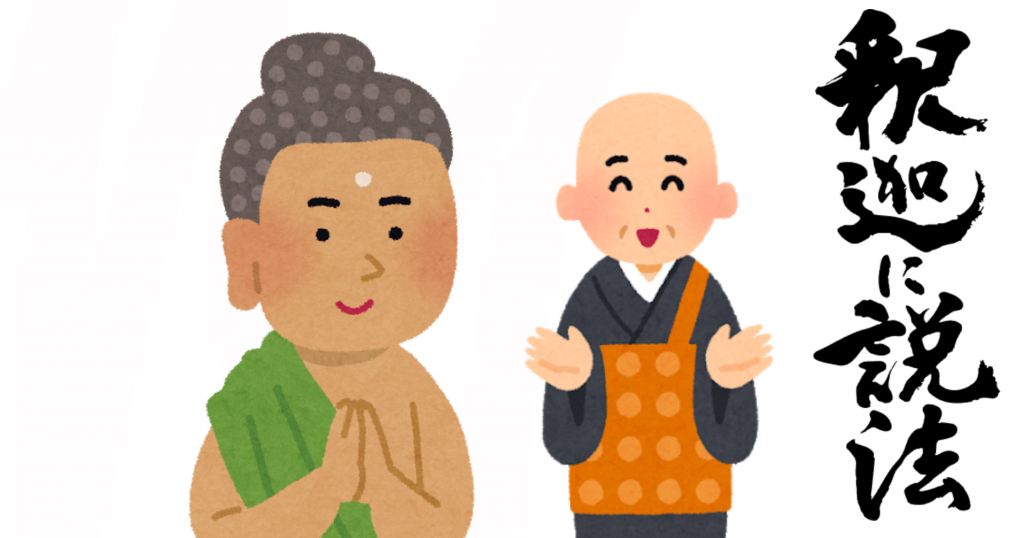It’s an abbreviation of a longer, more formal proverb that roughly translates as “preaching to the choir.”

Key Points
- A member of Generation Z recently ignited a controversy when addressing the president of his firm by using the slang term “shaka Sepo,” which means “preaching to the choir.”
- Luckily for him, the big boss loved it. Now the phrase is going viral.
- The Japanese language is constantly evolving, and words often get abbreviated when they become slang.
In Japan It’s Not Only What You Say…
Recently a newly hired recruit at a mid-size Japanese company ignited quite a controversy in the staid world of Japan Inc. This member of Generation Z had the audacity to utter nonchalantly the phrase “shaka Sepo” (釈迦セポ) when addressing none other than the president of his firm during a meeting. Although the young associate did not, apparently, mean anything by it, his fellow, more experienced colleagues were initially stunned by the use of this slang. At first, the president of the company was also a bit shocked.

There was an awkward, pregnant pause before the president burst into laughter and declared that he loved hearing this phrase. He subsequently vowed to make the word go viral on Twitter—which it has. His reaction certainly cut the tension in the cramped conference room. The dumfounded young employee subsequently sought an explanation for the reaction by his superiors.
The reason why the older associates in the room were initially shocked was that they had not previously heard anyone abbreviate the full proverb “shaka ni Sepo de kyoshuku desu” (釈迦に説法で恐縮です), which roughly translates into “preaching to the choir.” In Japanese not only what you say, but how you say something and to whom you are speaking, makes a big difference.
What Does “Shaka Sepo” (釈迦セポ) Mean?
The young associate apparently meant to defer to the established experience of the president of his firm during his presentation. His use the modern jargon for the term was completely unexpected and sounded somewhat inappropriate at first.
Do Not Preach to the Buddha

The phrase used by the newly hired employee is an abbreviation of a Japanese proverb derived from Buddhism. The direct translation of the Japanese phrase means “Do not preach to the Buddha” (because he already knows everything). Thus, the coincidental Western connotation with religion is curious.
More English Translations of Shaka Sepo
Another common translation for this phrase is “You shouldn’t try to teach a fish how to swim.” In other words, it is best not to give advice to another person who is already an expert or at least more knowledgeable than you are regarding a particular subject.
There is also an older version of this proverb in the English language. It is “Don’t teach your grandmother to suck eggs.”

This phrase apparently entered the English language from Spanish early in the 18th century. Back then most old people–including many grandmothers–had little or no teeth by the time that they reached their 40s. This dilemma directly impacted their diet. To obtain enough protein, it was common for people to poke a hole in a raw egg and then suck out its contents. Grandmothers would have had plenty of practice by the time their grandchildren were born. Thus, there was no need for some young “whippersnapper” to teach them how to do it.
This latest evolutionary tangent of the language is, however, only natural.
The Japanese Language Is Constantly Evolving
Like every language, Japanese is constantly changing. The Japanese are, however, very much tuned into how their language is evolving. As highlighted by Japan Insider in “The Big Reveal: 2021 Nominees for New Japanese Words,” the most popular words and phrases garner lots of attention.

New Trends
Although we are still barely into the new year, it seems as though “shaka Sepo” is already destined to make the list of finalists for new words and phrases for 2022.
It is now trending on Twitter in Japan. Takahiro Ikeuchi, CTO of Hakali Co., Ltd., which sells the application Awarefy, tweeted,
One of our new employees who graduated in 2021 abbreviated ‘Preaching to the Choir’ as ‘Shaka Sepo‘ during a meeting. The office went wild!
Often the most popular words are very short.
Abbreviations Galore
As any student of the Japanese language can attest, it seems as though the Japanese abbreviate virtually everything. Generation Z is now leading the charge.
Ryo (りょ)
“Ryo” (りょ), written in the Japanese alphabet called hiragana as opposed to kanji or Chinese characters, stands for the two syllable message “ryokai” (了解). Both terms mean “I understand,” although “ryo” conveys the simplicity of “got it.” Although the original word in kanji already seems brief enough, lately teenagers have been popularizing an even shorter form of the word via SNS.
Ri (り)
Teenagers now routinely use only the letter “ri” (り) to communicate that they do, in fact, “get it.” It is sort of like how only the letter “K” can be used to text that something is “okay.”
These examples are hardly unique.

Four Character Phrases
The Japanese language is filled with phrases that attempt to distill meaning down to only 4 characters or syllables. Here are some commonly used examples:
Tanabota (棚ぼた)
The approximate translation is “unexpected find” or “windfall.” It is basically “a stroke of good luck,” although the direct translation is “adzuki bean mochi (sticky rice cake) from a shelf.”

Doronawa (泥縄)
This term means “hastily trying to right a wrong after it’s too late to make difference.” The direct translation is “to braid a rope only after a thief has been caught (and tied up).”

Yabuhebi (藪蛇)
“Yabuhebi” actually refers to “a snake in a bush,” but it, essentially, means “to stir up a hornet’s nest” by needlessly making trouble.
Chiritsumo (ちりつも)
The abbreviation “chiritsumo“ comes from the Japanese proverb “gomi mo tsumoreba, yama to naru“ (塵も積もれば山となる). The term means “small things add up.” It is often associated with efforts to recycle.
Naruhaya (なるはや)
This simple phrase is routinely heard in an office. It is a shortened term for the phrase “narubeku hayaku“ (なるべく早く), which means “as soon as possible.” Thus, ”naruhaya“ is equivalent to ASAP.
Sasen (サーセン)
“Sasen” is commonly used by young Japanese in lieu of the more formal “sumimasen” (すみません), which means “Sorry!” It is about the most casual way to express this feeling in Japanese. There are, by the way, several other methods to convey the same meaning with much more formal language.

Azamasu (あざます)
Had the slang “azamasu” been popular back in the early 1980s, perhaps Styx would not have used the full “domo arigato” to say “thank you” to Mr. Roboto. “Azamasu” is a very casual way of saying “thanks” or just the abbreviation “TY” in a text message. Alternatives include “azasu” (あざーす) as well as “azassu” (あざっす).
I know; This is a lot to digest. Try out a few of these phrases with your Japanese friends, colleagues, or customers. They will probably be impressed. While I’m “shaka Sepo” (preaching to the choir) when I say that mastery of all of them will not be easy, just remember the wisdom of “chiritsumo“ (small things often add up)!
Link to Japanese Source: https://maidonanews.jp/article/14518139
Related Articles
AI Girlfriends: Exploring the World of Virtual Companions
AI-generated girlfriends are growing popular on Japanese Twitter. Learn more about what they can do, and what it could mean for the future.
Discover Japan’s Top 10 Must-Visit Places
From stunning landscapes to bustling cities, Japan offers many unforgettable experiences. Here are Japan’s top 10 best places to visit!





